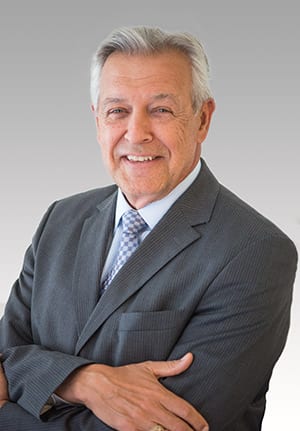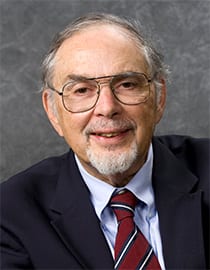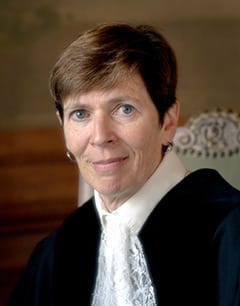By Andrew Cohen

A towering figure in international law who spent 26 years teaching at Berkeley Law, David Caron ’83 was fondly remembered by top scholars in the field—many of them former students—at a recent conference honoring his career.
“The reach and significance of David’s work is overwhelming,” said Dean Erwin Chemerinsky. “He was a successful dean, a renowned scholar, a popular teacher, an astute arbitrator, a respected judge—the list goes on.”
Caron held leading roles in international law and dispute resolution, serving as a judge at the Iran-U.S. Claims Tribunal and the International Court of Justice in The Hague. He was also president of the American Society of International Law and the Institute for Transnational Arbitration.
Held the day after a heartfelt memorial service, the conference addressed international dispute resolution, legitimacy in international law and institutions, and law of the sea and international environmental law. The title, “The Elegance of International Law,” came from a 2012 talk Caron gave urging people to seek elegant solutions when approaching complex legal problems.
“Borrowing from fields as diverse as architecture and mathematics, David argued that an elegant solution was one that solved multiple problems simultaneously, even problems we didn’t think were related,” said Professor Laurel Fletcher, director of the International Human Rights Law Clinic and one of the conference organizers.
Caron, who died in February, left Berkeley in 2013 to become dean at Dickson Poon School of Law at King’s College in London and stayed as a professor after leaving the deanship in 2016. At Berkeley Law, he co-directed the Miller Institute for Global Challenges and the Law, and with Professor Emeritus Harry Scheiber brought to the school the Law of the Sea Institute, an internationally recognized forum for ocean law scholarship and analysis.
“It’s particularly wonderful that we have a session on law of the sea,” said Scheiber, who taught a seminar on the subject with Caron and co-edited with him the groundbreaking book The Oceans in the Nuclear Age. “David was a major figure in the field, and his writings in that area really launched his career.”

Scheiber provided a historical overview of ocean law issues and identified key developments, including the increase of underwater technology, piracy, terrorism, transport of nuclear weapons, massive refugee movements by sea, and Russia building floating nuclear power plants. “These issues are pouring forth in new ways every day,” he said.
A military perspective
The breadth of Caron’s career was reflected by those in attendance—friends and colleagues from Berkeley, the U.S. Coast Guard, The Hague, London, and the greater international law community. A Coast Guard Academy graduate who then spent five years as an officer and deep-sea diver, Caron was the academy’s 2014 Distinguished Alumnus of the Year.
Berkeley Law Professor Emeritus and fellow veteran Richard Buxbaum ’53, Caron’s longtime international law colleague, cited that military background as a driving force behind his influential scholarship.
“It’s a very important part of having some reality check on any of our legal discussions,” Buxbaum said. “Those discussions often have to result in norms that officers such as those in attendance have to implement and critique. The academy can say whatever it wants and the (officers) can do whatever they want, but a grand exception was David Caron because he had one foot in each camp.”
International Court of Justice Judge Joan Donoghue ’81 echoed that sentiment. She noted that legal scholarship by practitioners often fails to put the topic in a larger context, while scholars regularly submit theoretical articles that seem disconnected from practical constraints.

“It’s like Goldilocks—one bowl of porridge is too hot, one bowl is too cold,” Donoghue said. “Whenever I’m working on a topic and discover David has written something on it, I’m just like Goldilocks … the bowl of porridge is just right. On topic after topic, David was able to synthesize and integrate the right balance.”
Cymie Payne ’97, a professor at Rutgers Law, described using one of Caron’s teaching techniques to promote that balanced approach—her students analyze an international environmental treaty of their choosing, then design a treaty for a current problem.
Examining legitimacy
Former U.S. Ambassador to Australia Jeff Bleich ’89 moderated a panel on the legitimacy of international law and institutions.
Tom Ginsburg ’97, a University of Chicago professor of international law, noted that the number of democracies peaked in 2006 and has since continued to dip. The Economist Intelligence Unit last year downgraded the U.S. from full democracy to flawed democracy.
“Even in well-established democracies … we’ve seen declines in the quality of the democratic governance,” Ginsburg said. “The mechanisms by which democracies decline are not what many think of, such as coups and revolutions. What we observe is the slow death of democracy by 1,000 cuts, erosion rather than collapse … almost always accomplished through at least nominally legal means, through manipulation of the law.”
UC Irvine Law Professor David Kaye ’95, UN Special Rapporteur on the promotion and protection of the right to freedom of opinion and expression, praised Caron for tackling the thorny issue of legitimacy—from the UN Security Council to global internet governance models. Kaye amplified four main questions Caron used to consider the legitimacy of international organizations:
(1) Do they entrust their operation to people who can claim independence of those being governed and have no interest in a given outcome? (2) What is the accountability of states entrusted with their operation? (3) Is there any third-party accountability mechanism, such as a court, to evaluate legitimacy? (4) Do they provide an opportunity for representative participation or foster ongoing dialogue about an action’s legitimacy?
“David explored head-on a question many scholars would shy away from,” Kaye said. “Legitimacy is a very difficult concept to deal with as a matter of law. Even in his call for change, a highlight of David’s scholarship is that it’s cognizant of the realities of international politics. He was idealistic and realistic in the same breath, which is remarkable and hard to pull off.”